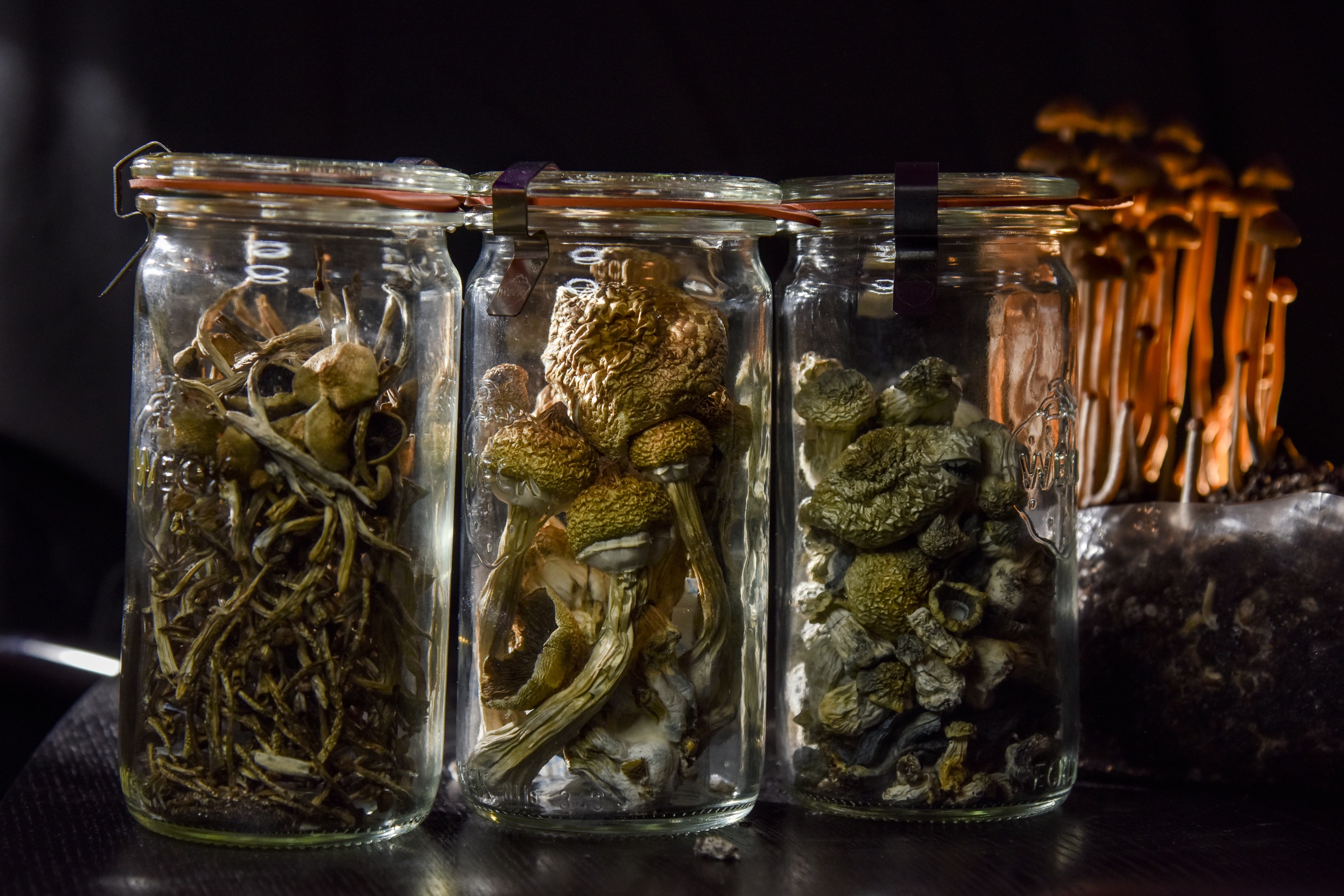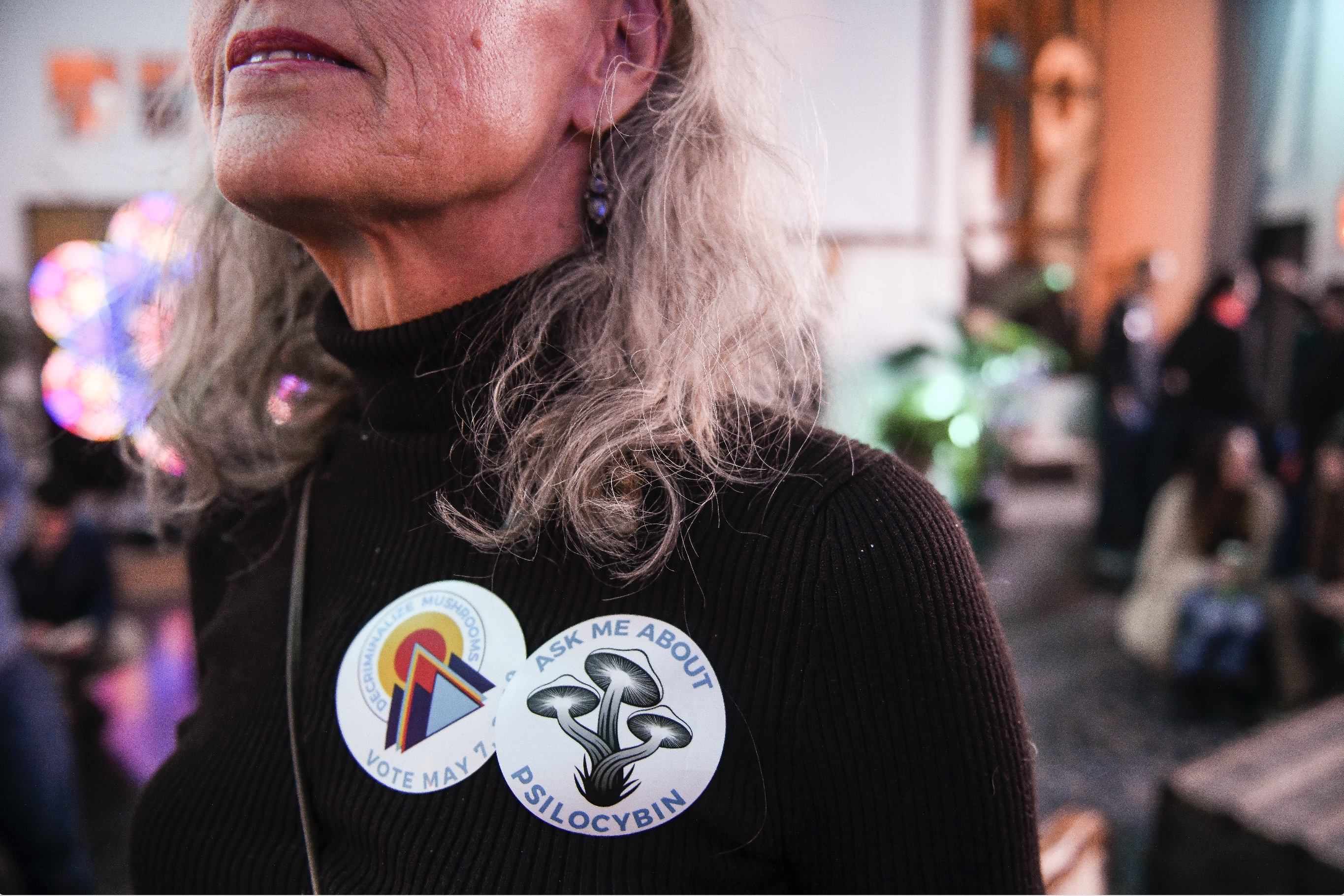
Psilocybin mushrooms aren’t for everyone, but they’re not exclusively for people who say things like “mind trip” or call a weekend in the woods a “journey” either. Creatives, scientists, the tech industry, wellness experts, regular people just trying to get by, and even chefs have found a variety of benefits in the unique experience that psilocybin can provide. The United States government might still view magic mushrooms as a potentially dangerous substance (the drug has had federal Schedule I designation since 1970, suggesting a high potential for abuse; research-wise it’s actually one of the safest drugs) but magic mushrooms have been used for centuries all over the world both as part of religious ceremonies, for medicine, and, yes, just for fun.
Now, thanks to a spate of recent studies that show the many therapeutic benefits of psilocybin, a shift has begun. America is reexamining the therapeutic potential of these powerful fungi. Just as the world’s top streamer, Netflix, which released both Fantastic Fungi and How to Change Your Mind this year — with both featuring psilocybin extensively and framing its usage in an overwhelmingly positive light.
Similar to cannabis, psilocybin seems to be on a steady march toward federal legalization while being legalized/ decriminalized by cities or states in the meantime. The willingness of governing bodies to reevaluate the old laws is due to the various health benefits the shrooms appear to hold, including the potential to help with depression, addiction, eating disorders, and post-traumatic stress. Those therapeutic effects challenge the Schedule I definition of psilocybin as a substance with “no currently accepted medical use,” and as more studies come to light, there is no doubt that broader legalization is in our near future (multiple states have legalization measures on the ballot for 2022).
So what’s the deal with magic mushrooms? Where can you legally enjoy them? And what resources are available to you if you want to learn more about this deep and rich world? We’re breaking that down in this explainer on all things psilocybin!
How Does It Work & What Does The Science Say?

When psilocybin — a naturally occurring psychoactive hallucinogenic compound — enters the body it turns to psilocin, which then binds to the 5-HT2A receptors in the brain. Those receptors regulate neurotransmitter chemicals related to mood, anxiety, appetite, and more which is why mushrooms might hold promise for people suffering from depression, anxiety, post-traumatic stress, addiction, and other psychological issues. It’s also what provides the visual altering, sense-enhancing, and intense sense of well-being that is characteristic of the mushroom “hero dose.”
Having said that, psilocybin isn’t for everyone, people who are actively taking SSRIs (though a recent study calls that into question), or who have a family history of psychotic disorders like schizophrenia are not currently advised to take magic mushrooms, especially in heavier doses.
Currently, there are only a few reputable published studies to back up the therapeutic benefits of psilocybin. Because federally psychedelic mushrooms are still illegal, large-scale studies are hard to come by. What’s out there so far is promising, though.
The most extensive studies have been conducted by the Johns Hopkins Center for Psychedelic and Consciousness Research and have been subsequently published in reputable scientific and medical journals. One study found that psychedelic treatment with psilocybin helped to relieve depression for up to a month in adults with a long-term history of depression. A follow-up study was conducted to measure the long-term effects which showed even more promise. Researchers found that psilocybin treatment produced large decreases in depression, with participants recording their depression severity as “low” for up to 12 months after initial treatment.
“Psilocybin not only produces significant and immediate effects, it also has a long duration, which suggests that it may be a uniquely useful new treatment for depression,” says Roland R. Griffiths, Ph.D. the founding director of the Johns Hopkins Center for Psychedelic and Consciousness Research in a news release on the study, “Compared to standard antidepressants, which must be taken for long stretches of time, psilocybin has the potential to enduringly relieve the symptoms of depression with one or two treatments.”
That’s huge, and it only scratches the surface of what researchers at Johns Hopkins have found. Since 2014, John Hopkins has conducted studies on psilocybin’s potential to help longtime smokers defeat nicotine addiction, ease the existential anxiety of cancer patients suffering from depression, assist in mitigating dependence and abuse of alcohol, and has called for the reclassification of psilocybin as a Schedule I drug to a Schedule IV drug — the same scheduling enjoyed by legal substances like Xanax, ambient, valium, and soma, to name a few.
In 2021, Johns Hopkins received the first federal grant for psychedelic treatment research in 50 years, which will be a big step in our exploration and understanding of the therapeutic benefits of psilocybin. So how are states reacting?
Where Are Magic Mushrooms Legal?
It’s important to point out that despite the research and the growing acceptance, psychedelic mushrooms are still illegal in the United States… for the most part. A few states have made recent efforts to decriminalize psychedelic mushrooms. Decriminalization is not legalization, so as of now psychedelic mushrooms are in a sort of weird legal limbo. Here is an updating list of the current rules in the decriminalized states.
California:
Since the passage of a 2019 citywide resolution, psychedelic mushrooms have been decriminalized in Oakland, along with other psychedelic plant-based entheogens including iboga, ayahuasca, and mescaline cacti. Santa Cruz followed in 2020 by decriminalizing the possession and cultivation of psilocybin mushrooms.
Colorado:
Colorado was the first state to decriminalize magic mushrooms in 2019, though that status only applies to the city of Denver. In 2022 Coloradans will vote on the proposed ballot initiative #58, Access to Natural Medicine, which sets to redefine psychedelic plants and fungi, including DMT, ibogaine, mescaline, and psilocybin, as natural medicine and decriminalize the personal use, possession, growth, and transport for people over the age of 21, statewide.
Massachusettes:
Psilocybin is decriminalized in four municipalities across the state of Massachusettes including Cambridge, Northampton, Easthampton, and Somerville. The commercial sale of psychedelics is still prohibited statewide.
Michigan:
Psychedelic mushrooms enjoy decriminalized status in Ann Arbor and Detroit and voters are currently proposing a similar ballot measure to Colorado’s for 2024. The Michigan Decriminalization of Psilocybin Mushrooms and Other Plants and Fungi initiative is set to appear on the ballot in the 2024 election.
Oregon:
Thanks to the passage of Measure 109 in 2020, Oregon is the first state to not only decriminalize psilocybin but outright legalize it for therapeutic use. The state is working out the kinks but it is set to be the first where you can legally obtain mushrooms from a licensed facility, so long as it’s for therapeutic use.
Washington:
In Seattle, psilocybin is decriminalized. Recently Washington state legislators filed SB 5660, aka the Washington Psilocybin Wellness and Opportunity Act, which will appear on the 2022 ballot and would enable the Department of Health to issue licenses to psilocybin manufacturing facilities, testing labs, service centers, and facilitators.
How To Get A Handle On Dosing
It’s not always easy to get a handle on dosing mushrooms as there are a lot of factors to consider including the species of mushrooms (in the US it’s often psilocybe cubensis, but not always), the strain, your weight, your state of mind, the last time you ate, and the amount you’re consuming at one time. It can all have a considerable effect on the experience. The general consensus is that if it’s your first time, you should start with a low dose, which should bring on feelings of euphoria and may enhance your senses a bit but even a “small dose” can range anywhere between .25 to 1 gram of dried mushrooms. A low dose is not a microdose, so if you’re interested in microdosing mushrooms, you’ll have to go even lower (often .1). Note: Most of the (many) studies on microdosing psilocybin refer to sub-perceptual doses, meaning you don’t consciously feel the effects.
Because there is no scientific consensus on this just yet, we recommend referencing a variety of different dosing guides. Leafly has a great one that underlines what to expect from a low to heavy dose and Sam Woofle put together a pretty comprehensive guide that covers dosing (from micro to heroic) and what sort of environments are most conducive to each dose on his blog Retreat.Guru.
Dosing is a very personal decision and it’s best not to let other people talk you into how little or much you should take. Play it safe and work your way up! A new study published in The Journal of Psychopharmacology and conducted by the Institute of Psychiatry, Psychology, and Neuroscience at King’s College In London found that psilocybin can be safely administered at doses of either 10mg or 25mg (about 1-2 grams of dried mushrooms) with no short or long term detrimental effects in healthy people.
What Resources Are Out There?

So you’ve read the science and you live in (or are visiting) one of the decriminalized states — how do you get your hands on magic mushrooms? For legal purposes… we can’t say, but there are a whole variety of online communities where you can connect with people who know the ins and outs of psilocybin. Sites like the Fungi Academy are incredibly helpful for both casually interested users and would-be amateur mycologists.
Reddit is also helpful (even for amateur growers). Communities like r/Psychonaut and r/Shrooms are great places to share experiences, learn more, and talk about the magic of mushrooms and other psychedelics, as well as learn safety measures and good practices for first-timers. As with any mind-altering substance you’re putting in your body, you’re going to want to do as much research as possible before you attempt to experience the world of psilocybin.
For those ready to embark on more learning on this subject, we wish you well. And have a good trip!
0 Commentaires